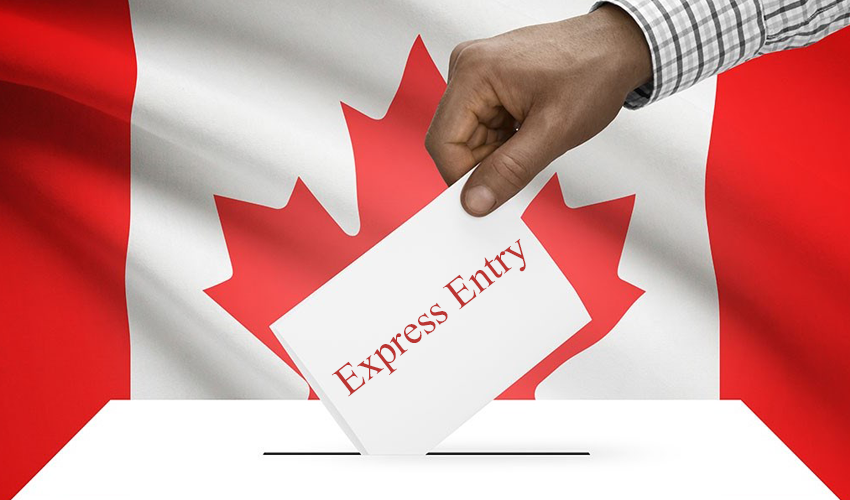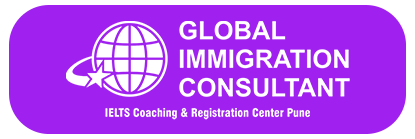- Drop Your Inquries at :
- +91 73785 94462
- +91 87930 75327
- +91 96999 78445
- +91 88057 64554
Express Entry
- Home
- Express Entry

Express Entry
Express Entry (EE) is an online immigration application system. Candidates categorized as skilled immigrants are required to submit a profile. Candidates with the highest rankings are eventually invited to apply for permanent residency based on a ranking system.
The Express Entry (EE) process facilitates applications under the following:
- Federal Skilled Worker – FSW
- Federal Skilled Trades – FST
- Canadian Experience Class – CEC
In addition, Express Entry also facilitates immigration via Provincial Nominee Programs (PNP). All territories across Canada will have access to review your profile, increasing the chances of permanent residency.

How Does It Work?
The Express Entry involves two steps:
- Complete an online Express Entry profile, be placed in pool of candidates
- Receive invitation to apply for permanent residence from IRCC.
Candidates in the pool are ranked using a point-based system named Comprehensive Ranking Score (CRS).
Getting into Express Entry doesn’t guarantee invitation to apply, since applicants have to meet all eligible and admissibility requirements. Upon entering the pool, candidates are assigned a CRS score based on factors including education, work experience, language ability, and other criteria. Highest-ranking candidates are regularly selected from draw and invited to apply for permanent residence.
Who is eligible for Express Entry?
Ideal Express Entry candidates have a university or college degree, relevant work experience, and a moderate level of English and/or French ability.
Candidates need to be qualified for one of the three federal programmes in order to submit a profile via the Express Entry system:
- Federal Skilled Worker (FSW)
- Federal Skilled Trades (FST)
- Canadian Experience Class (CEC)
What are the requirements for Express Entry?
In general, in order to qualify to apply to Express Entry as a skilled worker, you must:
- own at least one year of continuous full-time (or equivalent part-time) work experience in a skilled occupation over the last ten years.
- contain a minimum Canadian Language Benchmark (CLB) seven in either English or French as demonstrated on an approved language test.
- completed post-secondary education that has been evaluated using an Education Credential Assessment in accordance with Canadian criteria
These are the minimal requirements for submitting an application as a skilled worker to Canada’s Express Entry system. Even if you fulfil these qualifications, you may not be invited to apply for Canadian permanent residency. Candidates with stronger profiles are almost always chosen above those who only satisfy the minimum requirements.
How long does Express Entry take?
Express Entry can be processed in as little as six months from the time the Express Entry profile is submitted until a permanent resident visa is granted. Not every case will, however, develop thus swiftly. If you don’t get an invitation to apply, your Express Entry profile will stay active in the pool of applicants for 12 months. You are welcome to resubmit your profile and continue to be in the pool if after a year you have not gotten an invitation. To clarify it further:
- Your profile will be kept in the Express Entry pool for a year.
- You will have 60 days after the ITA is issued to provide the full set of documents that are required.
- IRCC may process your application in roughly six months after the immigration authorities receive your entire application and your permanent residence visa.
How are Express Entry points are calculated?
The Comprehensive Ranking System (CRS) score is typically meant when people talk about Canada’s “Express Entry points”. Candidates in the Express Entry pool are ranked in Canada based on the CRS score and a number of characteristics, such as:
- Age;
- Level of education;
- Proficiency in French or English;
- Foreign and Canadian work experience;
- Spouse factors; and
- Connections to Canada
Calculate Your Points
Eligibility to obtain an Invitation to Apply (ITA) for permanent residency is calculated on points obtained towards language ability, education, work experience, arranged employment, provincial nomination etc. If you are married, use the person with the highest education and language skills as the main applicant. This tool helps you to calculate score based on the answers you provide.
FAQ's
Who can migrate?
Generally, most of the countries look for applicants, who are skilled in their occupation with atleast 3+ years of experience, possessing a bachelor’s degree or higher qualification, also who prove their proficiency in the English language through various internationally recognized tests. Further for a few countries where applicants have blood relatives already residing or applicants having an offer of employment from an employer in the migrating country will be preferred.
Which country gives easy PR for Indian?
Canada offers easy PR Visa for skilled Indian workers.
Which is the best country to migrate from India?
The best nations to immigrate to from India are
- Australia
- Canada
- Finland
- Norway
- Germany
What is the easiest country to immigrate to?
The nations that are easiest to immigrate to are:
- Canada
- Australia
- Singapore
- Germany
- United Arab Emirates
What is the country with the most immigrants?
Below are the top 10 nations with most immigrants:
- The US – 46,627,102
- Germany – 12,005,690
- Russia – 11,643,276
- Saudi Arabia 10,185,945
- The UK – 8,543,120
- The UAE – 8,095,126
- Canada – 7,835,502
- Australia – 7,787,057
- France – 7,784,418
- Spain – 5,947,106
(*Based on UN Report entitled “Trends in International Migration”)
What documents do I need?
For the PR process, they require identity, qualification, experience, and proof of income, taxation, settlement funds, English language and other documents. The documentation differs from country to country and specific documentation might be required in few cases at various stages. In addition, few countries require Police Clearance Certificates and applicants may have to undergo health examinations as well.
How much funding balance should I show?
Normally it depends upon the country where you want to migrate and the visa type you are applying, for a few countries it is not a mandatory requirement to show the settlement funds. There are many countries which have it as a mandatory requirement as they basically want to know whether the applicant is aware of the cost of living and have sufficient funds to survive in the new country without depending upon the Government. This is again a basic requirement for a few countries where the visa type is specific to the state or region or the visa is being sponsored by the state or region.
What other information does my migration application ask for?
Basic demographic information, in addition to its information relating to qualifications, experience, English language scores, any other country residence information, dependents information, any relatives or friends information staying in the new country, health and character information.
Can I apply from inside the country I want to migrate to for my PR or must I be abroad?
Earlier there used to be a condition that once the PR is granted the applicant(s) need to move out of the country & re-enter. However now this has been relaxed by most of the countries, they are simply making the changes to the visa type and applicant(s) can remain in the new country as per the PR guidelines.
Do I need to deposit my passport with the embassy?
Countries like Australia don’t need the passport to be deposited with the embassy. However few countries it is a mandatory requirement, it depends upon the country which you want to migrate and visa type you are applying.
Is there a visa interview? What kinds of questions are asked?
It completely depends upon the visa type you are applying and the country you want to migrate, few countries it is a mandatory requirement to attend an interview as a part of the process. Normally they want to know the purpose for migration or visit and whether the intentions of the applicant are genuine, they check whether the applicant is meeting the requirements, also whether he/she will be able to survive in the migrating country without any sort of assistance.
What are the costs?
Costs will depend upon the country you are applying & the visa type normally there will be a visa fee in the migrating country’s currency, an applicant will have bear the other costs like migration agent fee, notary charges, courier charges, English language test charges, nomination & other authorities fee, in few instances like Parent Migration they might ask for security deposits as a part of assurance of support.
How long does it take to migrate?
Normally countries like Australia or Canada take 8-12 months or more, it differs from country to country. As per our experience in most of the cases, the duration of the process depends upon the way an applicant has planned his/her migration and willing to bank proactively on the favorable conditions, like how well the applicant is preparing in advance the documentation and other aspects of the process for the next stages. Again it differs from case to case basis & the type of the visa. We need to also understand that the applicant will not have any control on the timelines of the various authorities, however, he/she can definitely control the time consumption in filing the applications from his/her side.
Who all from my family can I take with me if I hold a PR visa?
Normally many countries allow spouse & children to be included as a part of the PR visa. Few countries might allow parents of the main applicant as well. After migrating on a PR many countries allow the PR holder to sponsor the close relatives who are eligible to migrate, take parents.
Can I work anywhere in my new country once I get my PR?
This again depends upon the type of the visa an applicant is planning to migrate few types of visas though they are PR visas will restrict the applicant to work study and live only in a specified state or region initially may be 2-3 years. Normally many countries have PR visas which allow an applicant to live across the country.
Can I study anywhere in my new country once I get my PR?
This depends upon the type of the visa under which an applicant is planning to migrate few types of visas though they are PR visas will restrict the applicant to work, study and live only in a specified state or region for some initial duration like 2-3 years. Normally many countries have PR visas which allow an applicant to study across the country.
Can my spouse also work?
Many countries are issuing the same type of visa to all the dependents included in the PR application, if they get the same visa then automatically it will allow the spouse to enjoy the same rights which are applicable for the main applicant. This applicant needs to check before he/she starts the process.
Will I still retain my Indian passport?
Countries like the UK, US, Canada, Australia, New Zealand, Italy etc. allow dual citizenship, wherein you can be a citizen of 2 or more countries. In case of countries like India, Singapore, Austria, Saudi Arabia etc. their constitution doesn’t allow dual citizenship, you cannot get Indian Passport or voting rights if you are a citizen of any other country. However, if an applicant wants to be only on a PR in the migrating country can continue his/her citizenship with India.
Can I take my pets with me?
Countries like Australia, Canada, and the UK etc. allow bringing pets at an extra cost. The pets should have been vaccinated few countries will not allow directly being imported, they need to be parked for few days or months in defined countries, after meeting the standards they will allow the pets into the migrating country’s quarantines for testing, subsequently, the pets are reunited with the owners.
Is there a medical test?
Many countries have made it mandatory to have a medical examination done before issuing the PR visa. Normally as a part of the examination process, they check if the applicant is free from the contagious diseases, he/she is possessing good health condition and don’t need assistance or will not depend upon the society or government or will not depend upon their health care system.
How can I find a job in my new country?
Applicants holding a PR will definitely have an advantage and will be preferred by the employers. There are many international job sites. where an applicant can post the profiles and get in touch with prospective employers. It is advisable to have a job before entering the new country so that applicants don’t have to face any problems in getting a job in the new country.
If my PR application is approved, when should I arrive in the country?
Generally many countries advice applicants to make the initial entry before the expiry of health & character certificates already submitted as a part of the PR process. For countries like Australia, they specify in the grant the initial entry date before which all the applicants included in the visa should make first entry.
What is a Police Clearance Certificate (PCC)?
Police Clearance Certificate (PCC) is issued to Indian Passport holders when they apply for immigration, residential status, employment, or a long-term visa. People going abroad on a Tourist or Visit visa do not require a PCC.
Which countries have made it mandatory to submit PCC?
You will have to submit a PCC if you intend migrating to the CANADA, U.S.A., the U.K. or Australia. Do note that you do not need a PCC for a Tourist visa.
